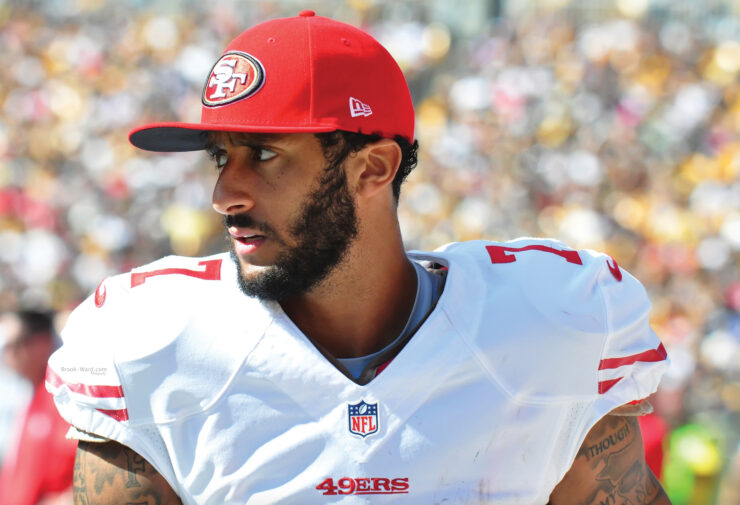Last month, San Francisco 49ers quarterback Colin Kaepernick drew divided reaction when he decided to sit down during the United States’ national anthem in protest of police brutality and attacks against black lives in America. While many have since spoken up in solidarity with Kaepernick, initial comments revolved around the inappropriate means by which he chose to protest.
Take University of Michigan’s football head coach Jim Harbaugh, Kaepernick’s former coach. In a press conference, Harbaugh acknowledged his right to sit during the anthem, but emphasized he did not “respect the motivation or the action.” Harbaugh later clarified via Twitter that it wasn’t the motivation he took issue with, it was the method of action.
Here lies an interesting distinction. While a person has the constitutional right to protest, as soon as it contradicts traditional views of American superiority, it’s deemed unacceptable by the NFL community and beyond.
Never mind that the U.S. constitution upholds the right to peaceful protest in its first amendment, or that the Federal Bureau of Investigation’s statistics from 1995 to 2012 show that black individuals shoulder 54.5 per cent of all hate crimes—an overwhelmingly greater number than in all other measured counterparts.
This is also an interesting reaction to Kaepernick’s silent protest given the slew of skeletons in the NFL’s closet, with players continuing to appear in team line ups after arrests made for charges of domestic violence, driving under the influence, among other offences—with the NFL barely blinking an eye.
Given the current state of black lives in the U.S., the clear human rights drawn out by the constitution, and the culture of silence the NFL community has endorsed, why are we drawing the line at a silent protest during the national anthem? Why does nationalism trump human rights?
Although it’s easy to criticize the U.S. while Kaepernick’s story dominates headlines, the problem isn’t contained to south of the border. In fact, the Kaepernick debacle draws an interesting parallel with the reaction of Canadians to the late Mauril Bélanger’s Bill C-210.
The bill seeks to change one line in the English version of the national anthem, from “true patriot love, in all thy sons command” to “in all of us command”, to ensure it is gender neutral. Although the change is seemingly minor, given that our Charter of Rights and Freedoms emphasizes equality of all “male and female persons”, it struck controversy in its first reading in Parliament and was voted down 144-127. At a second reading in May 2016, Bélanger received a standing ovation after reading the bill—but still faced an adamant opposition.
Bill C-210’s second reading was met with protest from the Conservative side, with MP Larry Maguire stating that “Rewriting the lyrics of our national anthem in the name of political correctness would go too far.” MP Karen Vecchio added that while her party does support women, the bill’s “gesture” does not create opportunities for women.
These reactions from Conservative MPs are troubling, given the reduction of the Status of Women Canada budget by 37 per cent under the previous Harper government. Beginning in October 2006, women’s rights organizations were no longer able to receive federal funding for advocacy, lobbying, research, or for the operation of services used primarily by women, such as rape crisis centres.
The Trudeau government has since taken steps to remedy this misguided relic of the Harper era, but it’s important to recognize the damage opposition to this change in our national anthem is causing to Canadian women.
The anthem has, in fact, been changed before, as Conservative MP Kelly Block mentioned during the second reading of Bill C-210. The lyric was changed from “thou dost in us command” to “in all thy sons command” in 1913, a change Block called a “proud reference to Canada’s history and the first time that Canada fought as an independent nation and won at Vimy Ridge.”
What Block failed to consider is that despite having limited rights in Canada at the time, 3,000 female nurses served in Canada’s armed forces, and 2,504 worked with the Canadian Army Medical Corps in World War One. Although no one is questioning the significance of the work Canadian men did at Vimy Ridge, it is essential to recognize that without the work women did both in medicine and on the home front, Canada may not have been as successful.
The lesson we can take from both of these events is that, throughout our nation’s long, rich history, women have proven that they deserve equal respect to men for elevating Canada to its successful place among world leaders today, just like black lives in America have the right to be safe and respected just as much as other lives do. And those facts should not be cast aside based on a gut reaction to blindly protect the perceived stature of a nation through the national anthem.
The tide has begun to turn this past week, as it was announced Kaepernick was—despite the skepticism—selected for the 49ers roster, and that his jersey sales skyrocketed to the third-highest selling jersey on the NFL Shop site. U.S. President Barack Obama also spoke out in support of Kaepernick, saying that he was “exercising his constitutional right” by protesting during the national anthem.
Among the 49ers fans that are burning jerseys is a clear group of supporters that understand the anthem is meant to represent all individuals across the nation, and aren’t afraid to challenge it when the country is failing to meet the needs of its citizens. Going forward this is something Canada must also keep in mind, because the lesson doesn’t change much when we talk about Canadian pride—when we’re afraid to challenge nationalism, that’s when our human rights record suffers the most.





